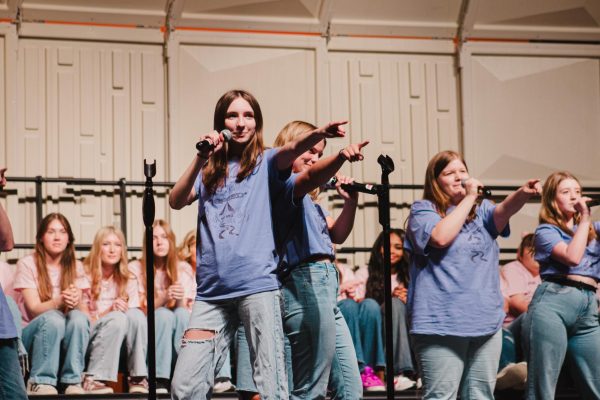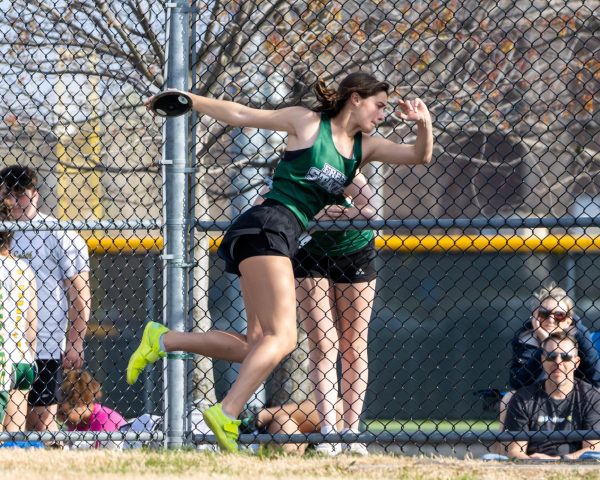Students help disabled children at Camp Barnabas
Shooting rifles and zip-lining usually aren’t activities that a 10-year-old with microdeletion syndrome can participate in, but at Camp Barnabas, kids like junior Colton Stallard’s camper Will, are given the opportunity to have a “normal” camp experience.
Last summer, several Free State students volunteered for a week at a Christian summer camp for kids with special needs in Purdy, Mo. As Christians in Action (CIAs), they spent every waking moment taking care of their own individual camper and helping with daily tasks such as using the restroom, taking a shower and getting dressed.
Not all high school Barnabas volunteers are tasked with the role of CIA. Freshmen in high school serve as Barnstormers, the clean up crew, waiting on campers’ tables and cleaning toilets.
High school graduates can be a part of Core Team, delivering water, selling items and doing other camp management tasks, or they can join the staffers and help a particular cabin’s volunteers with their campers. Each cabin has a pair of staffers who preside over them. Another staffer, who does not stay in the cabin, helps by supervising the cabin’s daily activities, and they are affectionately known as the Cabin Dad or Mom.
Everyone at camp wants the kids with special needs to feel loved by those around them and by God.
“The love we show on them is the love Jesus showed on us,” junior Ally Hertig said. “It’s just trying to show them, ‘Not only do we love you, but God loves you too,’ and how important each camper is, and how they are beautiful in our eyes and in God’s eyes.”
At Barnabas, each camper is unique and provides their CIA with an equally unique experience. Hertig’s camper Elizabeth was nonverbal, adding an extra challenge in communication.
“It was a struggle at first just trying to figure out how to understand each other and how to be able to communicate and understand everything that’s going on,” Hertig said. “… She would try to repeat things that I would say, which would get frustrating because I would ask her a question, and she would just try to repeat what I said.”
Despite the challenge, Hertig was able to gain an understanding of Elizabeth by spending time with her throughout the week.
“Spending 24 hours a day [with them], you eventually just know them like your sister,” Hertig said.
Hertig also adapted to different means of communication easier as the two became more acquainted.
“She could say ‘yes,’ and she could say ‘no,’” Hertig said. “… I learned some basic sign language: ‘potty,’ ‘more’ and ‘done’ were major ones … [To understand her there] was just a lot of interpreting how she acted throughout whatever we were doing.”
At camp, the focus is not on making the volunteers happy, but rather on enabling the campers to have a fun experience. In order to do this, Hertig had to learn how Elizabeth expressed her feelings.
“The camper always comes first,” Hertig said. “… You might want to be doing something different, but she might not necessarily want to be participating in the group activity. Putting your wants behind the camper’s.”
CIAs had to show an increased level of patience and love toward their campers. To remind themselves to put the camper first, volunteers have devised the acronym JOY: Jesus, then Others, then Yourself.
One night, Will removed his clothes and decided to take a bath. Another night, he sprayed shaving cream all over the cabin, and on yet another occasion, he poured laundry detergent on the cabin floor. Stallard, however, was never angry with him.
“It was like, ‘Oh that was so funny, I couldn’t be mad at you,’” Stallard said.
Through time, Stallard also learned how Will functioned and what his personality was like. Stallard learned that Will liked to collect hair and grab others’ belongings. Stallard demonstrated Will’s behavior by snatching a phone and pencil from the desk.
Junior Curtis Zicker felt that the most rewarding part about the trip was seeing his autistic camper Sean progress throughout the week.
“At the beginning of the week, he was crying a lot of the time, and he missed his mom, and he really didn’t want to be there,” Zicker said. “But then, by the end of the week, he had kind of grown to love the camp a little more, and he was sad to leave.”
Zicker finally saw Sean begin to enjoy camp when he spotted a man in a moose costume at one of the parties.
“… At one of the parties we had someone dressed up in a moose costume, and you were supposed to find … him,” Zicker said, “And [Sean] was really excited, and he had me take a picture with him and the moose.”
Even though Zicker’s camper had less breakdowns as the week went on, he still often preferred to be alone. Zicker felt this was an extra challenge since being around others helped him bond with Sean.
“My camper liked to run away and be away from people,” Zicker said. “He liked to have alone time.”
Because of this fleeting behavior, staff members and volunteers must keep a vigilant eye on their campers at all times. On one occasion during morning devotionals, a camper attempted to jump onto a cross and off the adjacent cliff high above the valley below when his CIA diverted his attention for only a moment.
“In just that instant, he saw the cross, … and I don’t think he realized that it wasn’t safe,” Hertig said. “… You can never take a mental break just because [when] you take that rest for yourself, … you don’t know where your camper is.”
The CIAs physical exhaustion at the end of the week only strengthened the volunteers’ faith in God.
“[The trip] changed my outlook a lot on faith,” Zicker said. “… [There] was a lot of giving everything to what you were doing because God will give back the energy.”
During the day, campers can fish, shoot rifles, swim, zip line and do other typical summer camp activities. Each night, campers attended a differently themed party.
On Friday, the camp takes on a more serious tone with the Prayer Walk. During the walk, a cross with a plaque containing the names of deceased campers is passed around from cabin to cabin and prayed over, eventually arriving at the tennis courts.
“That’s kind of an emotional, solemn night,” Stallard said, “… You go back to the camp tennis courts after you pray over the cross, and then campers come up and tell what they were going to miss about camp.”
Despite the night’s serious mood, Will still found a way to have fun.
“My camper had this whole thing lined up [for what he would miss about camp], and I’m like, ‘Alright, dude, this is gonna be great,’” Stallard said. “Then he gets up there, and he goes, ‘Doggies in the windows,’ and he starts cracking up.”
On the last night of camp, the campers dressed up in their ball gowns and tuxedos for the royal ball. Stallard feels that this dance was better than any held at Free State.
“There’s no awkward circles,” Stallard said. “Everyone’s dancing no matter what … You just do what you do, and no one judges you. [You can] kind of bring out that inner dork.”
After camp, students felt more drawn towards people with special needs because they realized how fulfilling the interactions can be.
“I want to meet [more people with special needs] because they are so much fun to be around,” Stallard said.
Along with wanting to know them better, the volunteers feel that people with special needs should be treated like anyone else.
“They’re just people,” Hertig said. “They don’t need to be put in a box of having special needs or having a disability. They’re still people, and a lot of people don’t understand [that] … Each person is unique and different.”
Your donation will support the student journalists of Lawrence Free State High School. Your contribution will allow us to purchase equipment and cover our annual website hosting costs.







